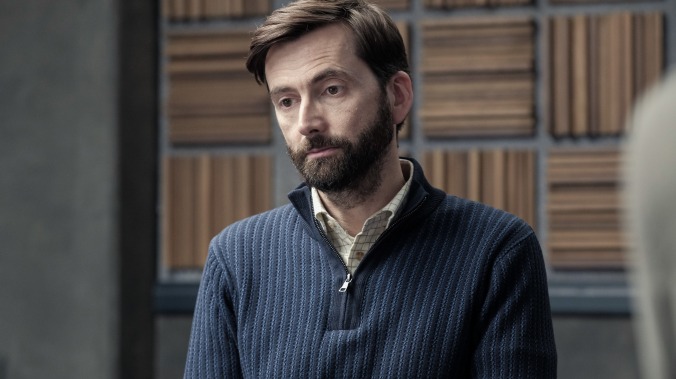A Law & Order of one’s own: Netflix delivers a satisfying procedural with Criminal


Congratulations to Netflix: After over seven years of commissioning original series, it finally got around to creating its own Law & Order. This isn’t intended as a slam on its new international production, Criminal, but rather a compliment. The long-running NBC procedural didn’t run for 20 seasons, and launch multiple spinoffs, by accident; by offering up a weekly crime being solved by engaging detectives, the series combined satisfying stand-alone storytelling with interesting character arcs, the television equivalent of comfort food. Criminal scratches that itch, but also brings with it some important innovations and tweaks that elevate it into a truly interesting narrative experiment. For one thing, the anthology series was developed with the keen awareness that Netflix is a global brand, and so the 12 episodes of this first season are spread across four different countries—Germany, Spain, France, and the United Kingdom.
In fact, the 12 episodes (which were all shot at the Netflix studios at Ciudad de la Tele in Madrid) are listed as four different shows across the platform, and in many ways, they are four different shows, with four different regular casts, four different directors, and four different languages spoken. What they have in common, though, is the format: an interrogation room at a police station, an accused person sitting on one side of the table, and a team of officers determined to get a confession, or at least the information they need to stop future crimes. The danger of this sort of stripped-down approach is the potential for the show to feel like a miniature play, but Criminal avoids this trap by keeping the interplay among interrogation room, observation chamber, and the office outside dynamic. The view point on what’s happening constantly shifts as we see the officers try to puzzle together the truth behind the stories of the accused, while the accused scrambles to claim their innocence.
One thing that always worked well about the Law & Order format was the occasional glimpses into the lives of the main characters outside of the stations. While always secondary to the work being done, the show (and its spinoffs) often found ways to offer hints of drama at home, or interpersonal conflicts that go beyond the job. There’s a fair bit more of that in Criminal, as Netflix shows always lend themselves to serialization, and those moments go a long way to make these characters feel less like crime-solving props and more like people.
Unlike Law & Order, we don’t get to see the outcome of each eventual case, but the implication of what will happen next is typically clear. Most of the crimes involve a murder or accidental death. Because every episode begins after the arrest of the criminal, the storytelling begins in medias res, forcing the viewer to play catch-up as to the nature of the crime committed. But the interrogation format works well in terms of revealing a large amount of information quite quickly, and the simplicity of the framework means that the caliber of acting stands out clearly.
Criminal: UK perhaps delivers the biggest star power for English-speaking audiences, with David Tennant and Hayley Atwell each guest-starring as an episode’s criminal du jour. The résumés of the other casts are also quite long and notable, including Florence Kasumba (Black Panther, The Lion King), Nathalie Baye (Catch Me If You Can), Laurent Lucas (The Returned), and Emma Suárez (Pedro Almodóvar’s Julieta). It’s a great use of local talent, and while the entire show is officially run by George Kay (Killing Eve, The Hour) and Jim Field Smith (Endeavour, The Wrong Mans), there are country-specific writers and directors ensuring that each branch of the series is authentic to the nation in question.
The series was created by Kay and Smith, the latter of whom also directed the U.K. episodes; the other episodes were directed by Oliver Hirschbiegel (Germany), Mariano Barroso (Spain), and Frederic Mermoud (France). Among them and the several listed writers, there wasn’t a single woman involved in the production behind the scenes, which is a disappointing look for 2019. There are interesting female characters across all the series, but hopefully future seasons would consider expanding on that lack of gender diversity.
The potential for this show going forward feels immeasurable—potentially adding more countries, especially some outside of Europe, or just continuing with each one of these different precincts, learning more about these detectives as they continue to solve crimes. As Law & Order showed us, there’s an inexhaustible well of stories to be told about people behaving badly and getting caught for it. Especially for foreign viewers, it’s fun to see the similarities and differences in the quirks of the various justice systems—the differences in technology and official phrasings used. Beyond that, there are stories that incorporate the individual histories of each country; for example, the first episode of Criminal: Germany features a mystery deeply rooted in the legacy of the 1990 German reunification, with one character remarking that “you can always tell an East and West German apart.”
That said, stories like a man accused of killing his step-daughter or a businessman who is definitely guilty of hate speech as well as maybe a hate crime, have well-worn premises. But each one also manages to flip our expectations, offering up surprising twists that highlight the humanity of the accused, who are never quite as evil as you might think. It’s a tricky balance, finding ways to ensure that each episode feels unique but also relatable, yet Criminal makes it work. After all, the word “criminal,” in many languages, is the same to some degree—in Germany, it’s “kriminell,” in France, it’s spelled “criminel.” But no matter what language it’s in, it’s still the starting point for something truly compelling.